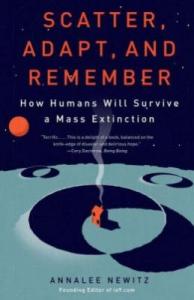Annalee Newitz: Scatter, Adapt and Remember
HOW HUMANS WILL SURVIVE A MASS EXTINCTION
Annalee Newitz
Doubleday, Hardcover, May 14, 2013, $26.95;
Trade Paperback, April 8, 2014, $16.00
ISBN-10: 0385535910, ISBN-13: 978-0385535915
Newitz reports:
This is a book about how humanity might survive the worst disaster that could ever befall our planet. Mass extinctions have happened at least five times before in Earth's history, and they are generally associated with climate change — which is why many scientists believe we may be in the early stages of one right now.What we know for sure is that mass extinctions are basically inevitable, regardless of whether we cause one or it comes in the form of a flaming ball of rock from space. Is there anything we do now to make sure that Homo sapiens is one of the species that survives? I talked to scientists, futurists, engineers, philosophers, and city planners about what it would take for us make it through this terrifying disaster.
I developed the idea because I've always been fascinated by disaster movies, and I wanted to write about a realistic scenario in which disaster isn't just inevitable but plausible. About halfway through researching the book, I realized that humans actually have a chance of surviving this kind of catastrophe. And that was when I decided that I wanted to focus on survival.
I wish I'd come up with a better strategy for storing my research notes before I started. At first, I wasn't tracking all the sources I was reading, and it was a nightmare when I went to do my endnotes.
Luckily, I did come up with a system about a quarter of the way through the project: For each chapter, I kept a running file of all the sources I consulted and everyone I interviewed. Then, when I was finished, it was relatively easy to convert that file into endnotes.
Contact info:
- Annalee Newitz, annalee@gmail.com, www.annaleenewitz.com
- Publicist: Alex Houstoun, 212-572-2882, Ahoustoun@randomhouse.com
- Agent: Laurie Fox, 510-435-3635, Laurie@LindaChester.com
- Book website: www.scatteradaptandremember.com
- Blog website: www.annaleenewitz.com
NASW members: will your book be published soon? Take advantage of this opportunity for shameless self-promotion.
Tell your fellow NASW members tell how you came up with the idea for your book, developed a proposal, found an agent and publisher, conducted research, put the book together, and what you wish you’d known before you started your project.
See https://www.nasw.org/advance-copy-submission-guidelines.
Send info and images to Lynne Lamberg, NASW book editor, llamberg@nasw.org.





